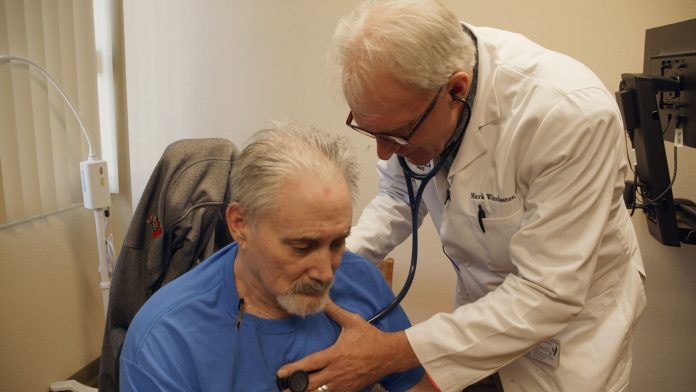
A single mosquito bite leaves a man paralyzed. It sounds like headline from the tabloids, but it’s not. It’s all too real for one Oklahoma City man.
56-year-old Joe Fenton was on the job, working outside. He glanced down and saw a mosquito land, but his hands were full.
“By the time I got my hands emptied out, the mosquito was still there. I got even with the mosquito, though. I smacked him good,” Fenton said.
He really didn’t think much about it. Afterall, everyone gets bitten by a mosquito every now and then, but this time was different.
“It started with dragging my foot every couple of steps. That was about a week after the bite. It went from there to losing all mobility in my foot,” Fenton explained.
The paralysis quickly spread, leaving him hospitalized. Fenton spent nine long months in the hospital. The culprit was West Nile Virus.
“Most people have heard, at least vaguely, about West Nile disease or West Nile fever and that it’s carried by mosquitoes,” said Dr. Mark Winchester, who cares for patients at a program called Valir Pace in Oklahoma City. “We know that West Nile, a lot of times, is mild enough that it’s not even diagnosed. Those who develop West Nile Fever are the ones who do get tracked.”
Winchester explained that the virus causes flu-like symptoms for those patients, but for an unlucky few (about one in 150 cases), it is worse – much worse.
“Those individuals get something called West Nile encephalopathy, in which the virus attacks the microcirculation that feeds your nervous system. So, it impacts not only your peripheral nervous system that works your spinal cord and your limbs and everything down below your head, but it attacks your brain too. So, it’s really a disastrous thing that happens.”
For Fenton, it stole everything. Fenton found himself bed-ridden and forced to rely on others just to survive. It was a bitter pill to swallow.
“I was very active, living a perfect life and it was snatched out from under me pretty quick,” he said.
Fortunately, Fenton found Valir Pace or as he puts it, “it found him.”
Valir Pace is a non-profit program that utilizes a team-based approach to provide personalized, all-inclusive, comprehensive care to those at risk for poor health outcomes and without access to quality care.
“We’ve been able to provide him transportation to come to Pace and he’s been getting therapy five days a week with physical therapy, occupational therapy and an individual wellness plan where he gets to do his exercise program supervised by a restorative aide,” said Christina Tilford, DPT, a therapist with Valir Pace.
The program also ensures Fenton gets the medical care and the medications he needs too, and there’s more.
“They feed me a meal. They feed me two meals actually and then they give me another ride home. I’ve got a physician here. I’ve got nurses here. I’ve just got a great team behind me. I’m very grateful for them. It was hard to get used to a wheelchair. You take an active kid that doesn’t want to be in a wheelchair and it’s just kind of hard. Pace really helped me along with that and helped me to accept a lot of things now that are changed in my life,” Fenton said.
Those who know him will tell you that Fenton never shied away from hard work and he is working hard at Pace too. He pushes himself with therapy and exercise as much as three times a day at Pace.
“They aren’t going to give up on me, so I’m not going to give up on myself,” he remarked. “I come five days a week and love every minute of it. I would come more if they were open on weekends, but they have to have a day off too.”
Every day, there are new ‘firsts’ for Fenton.
“When he came into the program, he could barely move. It required 3 people to even try to stand up. Now, he’s able to stand up tall with my help. He’s able to do it with one person,” Tilford said. “I’m very fortunate that I get to work with Joe to see what he has overcome and he’s still making progress.”
For Fenton, progress is measured in milestones, not days.
“And here I am today still going forward,” Fenton said. “I don’t recommend the mosquito bite, but I highly recommend Pace.”
To learn more about the Valir Pace program visit www.ValirPace.org.












